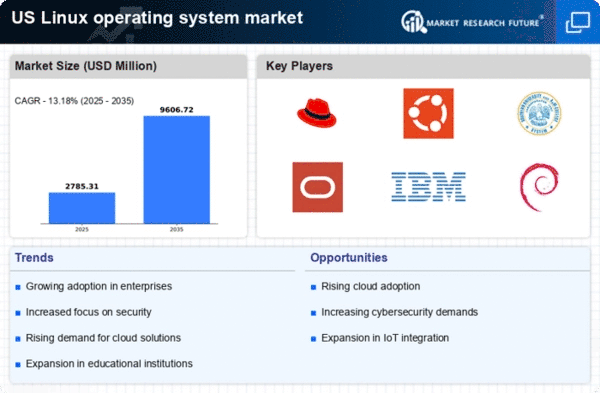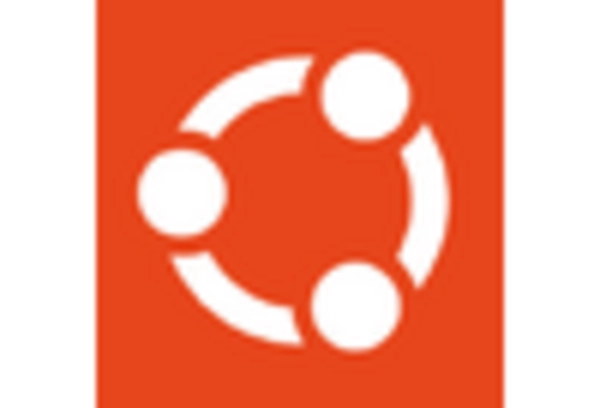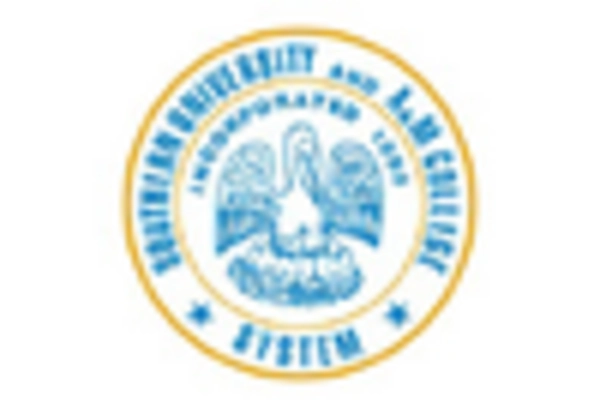Rising Cybersecurity Concerns
Cybersecurity remains a critical issue for organizations across various sectors, influencing the Linux operating system market. With increasing incidents of data breaches and cyberattacks, companies are prioritizing secure operating systems. Linux, known for its robust security features, is becoming a preferred choice for enterprises looking to safeguard their data. In 2025, it is projected that the market share of Linux in the cybersecurity domain will increase by 15%, as organizations seek to mitigate risks associated with cyber threats. This heightened focus on security is likely to drive further investment in the linux operating-system market, as businesses aim to protect sensitive information and maintain compliance with regulatory standards.
Growth of IoT and Edge Computing
The proliferation of Internet of Things (IoT) devices and the rise of edge computing are significantly impacting the Linux operating system market. As more devices become interconnected, the need for efficient and scalable operating systems becomes paramount. Linux is well-suited for IoT applications due to its lightweight nature and adaptability. In 2025, it is anticipated that the adoption of Linux in IoT solutions will account for over 40% of the market, driven by its ability to support diverse hardware and software environments. This trend indicates a growing reliance on Linux for managing and processing data at the edge, further solidifying its position in the operating system landscape.
Emergence of Hybrid Cloud Solutions
The emergence of hybrid cloud solutions is driving transformation within the Linux operating system market. Organizations are increasingly adopting hybrid models to balance on-premises infrastructure with cloud services, seeking flexibility and cost efficiency. In 2025, it is projected that the hybrid cloud market will grow by 25%, with Linux playing a crucial role in this evolution. Its compatibility with various cloud platforms and ability to support diverse workloads make it an attractive choice for businesses navigating the complexities of hybrid environments. This trend suggests a sustained demand for Linux-based solutions as organizations aim to optimize their IT strategies and enhance operational resilience.
Increased Demand for Open Source Solutions
the Linux operating system market is experiencing a notable surge in demand for open source solutions. Organizations are increasingly recognizing the benefits of open source software, including cost savings and flexibility. In 2025, it is estimated that the adoption of open source solutions in the enterprise sector will reach approximately 70%, reflecting a significant shift in software procurement strategies. This trend is driven by the desire for customization and control over software environments, which proprietary systems often do not provide. As businesses seek to enhance their operational efficiency, the Linux operating system market is positioned to benefit from this growing preference for open source alternatives.
Shift Towards Containerization and Microservices
The shift towards containerization and microservices architecture is reshaping the Linux operating system market. As organizations strive for agility and scalability, they are increasingly adopting container technologies, which often rely on Linux-based systems. In 2025, it is expected that over 60% of enterprises will implement container orchestration platforms, with Linux as the underlying operating system. This trend is indicative of a broader movement towards DevOps practices, where rapid deployment and continuous integration are essential. The linux operating-system market stands to gain from this transition, as businesses seek to leverage the benefits of containerization for their software development and deployment processes.
















